Why Does My Dog Sleep By the Door? [9 Reasons]
Whether it’s something you’ve always wondered about or a recent occurrence, you may find yourself asking, “why does my dog sleep by the door?”
Well, fellow curious dog owner, there are many reasons your dog might sleep by the door, and sometimes there’s no reason at all. Here are nine common reasons you might find your dog snoozing in the entryway and what you can do in each situation.

1. Acting as a Guardian
Does your dog bark when the doorbell rings? Do they always come running to see who knocked? Your dog is likely guarding you and your house.
Dogs are loyal companions willing to do almost anything to protect their owners. So if your dog sleeps by the door, they may be doing it as an act of protection, putting themselves between you and a possible threat.
Whether your dog sleeps by the front or bedroom door at night, they may do it out of a protective instinct. Positive reinforcement is the best training method to help teach your dog to bark less at visitors and sleep somewhere else.
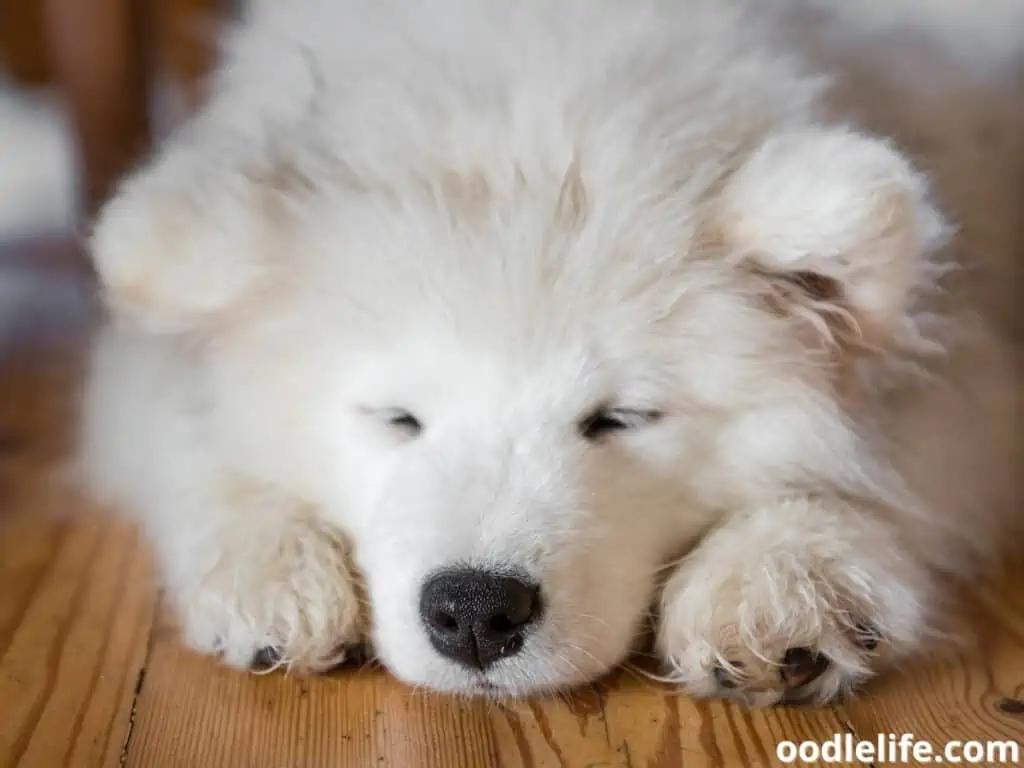
2. Waiting for You
If you get back from work and find your furry friend blocking the door or see your door sleep by the door through nanny cams while you’re away, then they’re likely waiting for you to get home.
Dogs are very affectionate creatures which means they can get lonely quickly and are often bored when alone. They don’t know what to do with themselves once you leave.
Most of the time, you won’t need to do anything about this, but if you find your dog sleeping by the door annoying or you’re concerned about them, there are a couple of solutions.
While proper training and behavior exercises might help reduce how often they sleep by the door, making sure they have entertainment or company is a better option.
Give your dog some toys they can play with on their own or get another pet to keep them company, especially if you live alone.

3. Eager to Exercise
Some dogs just love going for walks. They get excited to run, frolic, and play and want to be outside all the time. If your dog sleeps by the door and hops up with tail wagging when you approach, they probably want to go exercise.
Depending on your dog’s breed, they may need a lot more exercise than one or two walks per day. Some dogs are both extremely energetic and athletic and love to burn off energy through running.
There are two factors that affect how you should approach such a predicament. Either your dog loves to play and exercise, or they like to play with you. If you spend the most time with your dog during walks, their desire to go out could stem from a lack of consistent attention.
If your dog merely has too much energy, try increasing the number of walks or invest in a dog treadmill if you don’t have the time. If your dog wants to go out to be with you, try spending more quality time with your dog inside and show them that you will give them attention outside of walks, too.
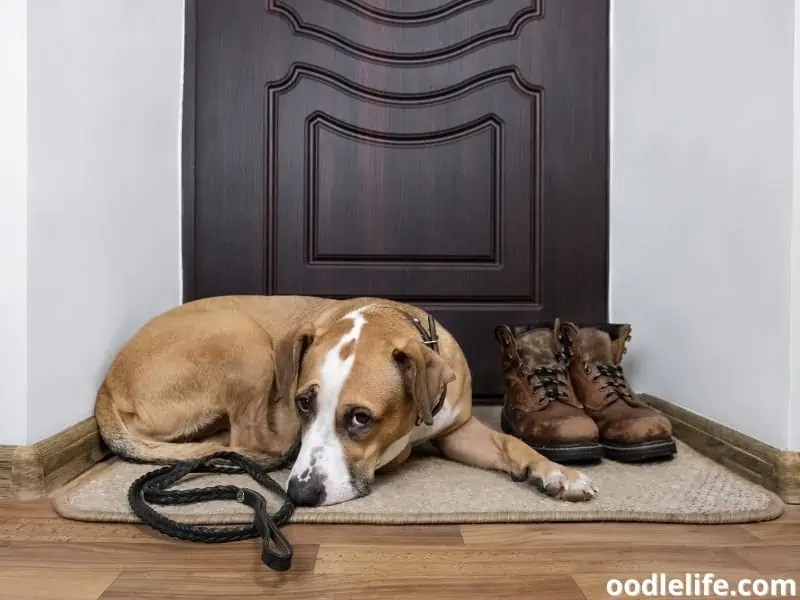
4. Territory Marking
Territory marking is especially common for dogs facing a new environment. For example, if you recently moved, got a new pet, partner, roommate, or baby, or made significant changes to your home, your dog may be reaffirming their domain.
Your house is as much a home to your dog as it is to you, and just as you might paint and decorate to add personal touches, your dog may spread scents, assert dominance, and physically station themselves in crucial places to make it more their home.
Behavioral training can help reduce these behaviors, but they should subside after a time on their own if they were brought about due to an abrupt change in environment.
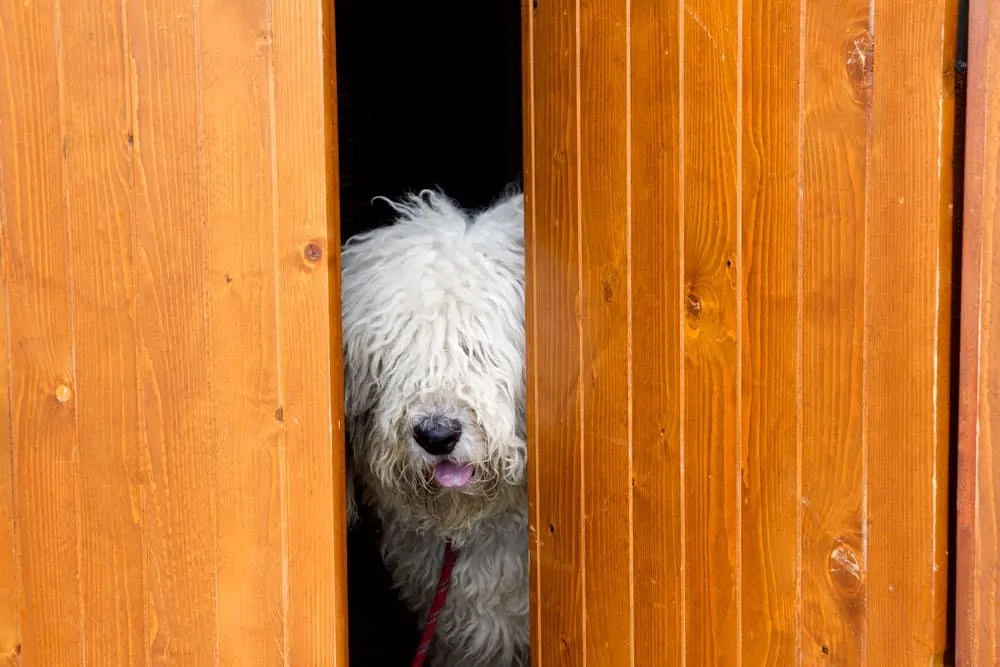
5. Exerting Control
Some dogs just like to be in control. A dog that sleeps in front of the door because they feel superior can police your behavior by controlling your access to the outside or other rooms.
If your dog doesn’t listen well or follow commands, it might be a sign that they see themselves as the leader of the household. When a dog acts as the leader, they both feel responsible for and exert power over whoever they count as a pack member.
If your dog blocks the door to prevent you from using it or monitor you as you do, this may be a sign of greater behavioral patterns.
Behavioral training and an assertive communication style can help you build a better rapport with your dog. You should also seek proper training for them if they prevent other pets from traveling freely.

6. Fear of Loneliness
Dogs with a fear of loneliness or separation anxiety may sleep by the door to prevent you from leaving or as means to try to get you to take them with you.
If your dog whines and gets in the way when you leave the house, they probably want you to stay. Just as a child might throw a tantrum when their parent goes to work, dogs will also do what they can to keep you at home.
Some dogs sleep by the door to act as a physical barrier to keep you in the house, while others sleep there so that you notice them when you leave. Dogs that do the latter are scared of being forgotten or left behind and want to go out with you.
Socialization and behavior training can help reduce your dog’s anxiety and limit this type of behavior, but it may not fix it entirely.

7. Curious Nature
If your dog is the type to always jump to attention at strange noises, insert themselves into activities, and run up to strangers, then your dog may be sleeping by the door to satiate their curiosity.
If you shut your dog out of your room at night or they sleep by the front door, they may be positioning themselves there to stay in the loop.
If they can hear noises or people on the other side or are interested in knowing what’s beyond the door, they may sleep there in hopes of getting an opportunity to find out. Just think of it like that one coworker who always has their ear to the ground for the latest gossip and always knows just where to be to get the best scoop.
Showing your dog what’s on the other side of the door may satisfy them, but they will likely continue to sleep there as they enjoy knowing what’s going on.
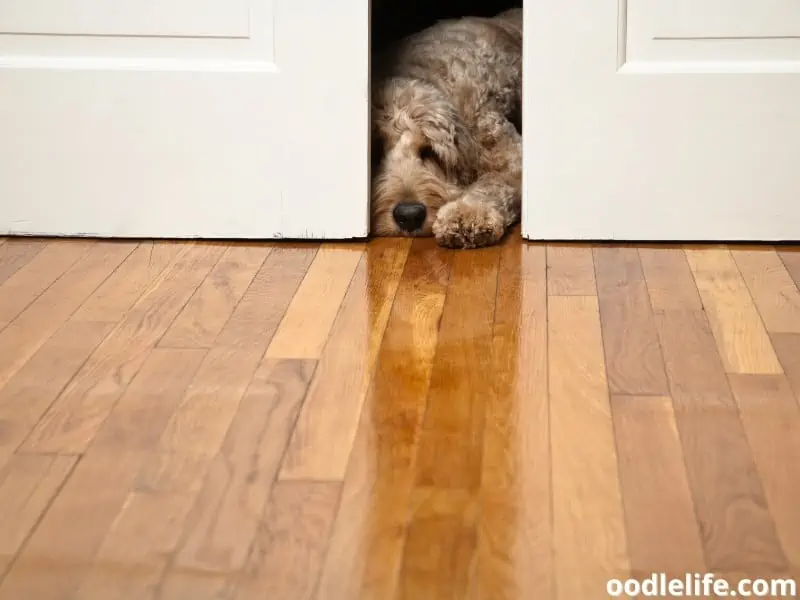
8. Seeking Attention
Your dog knows you use the door. They see you come in and out and associate that with a certain level of importance to you. A dog that sleeps by the door may be doing so as a way to seek out attention from you.
If your dog sleeps by the door, and especially if they hang around other items you interact with frequently, they may be vying for attention.
A dog that exhibits these behaviors may be lonely, feeling neglected, or attention-hungry. Try interacting with your dog more, especially when they are not by the door, or they will learn that the only way to get attention is to continue sleeping by the door.
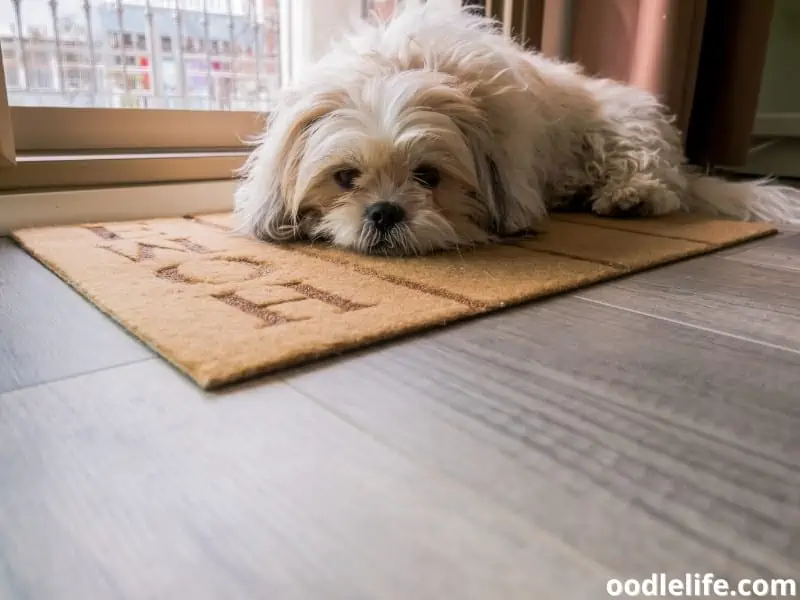
9. Better Breeze
Dogs are covered in fur. They can get quite hot, especially in the summer. You’ve probably seen your dog sprawl out on the kitchen floor or bathroom tile on hot summer days.
If your dog is feeling toasty and looking for a nice place to cool down, they may choose to sleep by the door. The front door, garage door, and doors between rooms may have a large enough gap under them to allow for significant airflow.
Hold your hand by the bottom of the door or place it on the floor where your dog normally lays and see if you can feel a temperature difference. If you feel a breeze or the floor is cool to the touch, your dog is likely sleeping there because it’s a comfortable temperature.
If you don’t want your dog sleeping by the door, try setting a fan up for them where you would prefer them to sleep.
